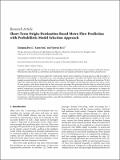| dc.contributor.author | Dai, Xiaoqing | |
| dc.contributor.author | Sun, Lijun | |
| dc.contributor.author | Xu, Yanyan | |
| dc.date.accessioned | 2018-07-03T12:59:46Z | |
| dc.date.available | 2018-07-03T12:59:46Z | |
| dc.date.issued | 2018-06 | |
| dc.date.submitted | 2018-05 | |
| dc.identifier.issn | 0197-6729 | |
| dc.identifier.issn | 2042-3195 | |
| dc.identifier.uri | http://hdl.handle.net/1721.1/116744 | |
| dc.description.abstract | Reliable prediction of short-term passenger flow could greatly support metro authorities’ decision processes, help passengers to adjust their travel schedule, or, in extreme cases, assist emergency management. The inflow and outflow of the metro station are strongly associated with the travel demand within metro networks. The purpose of this paper is to obtain such prediction. We first collect the origin-destination information from the smart-card data and explore the passenger flow patterns in a metro system. We then propose a data driven framework for short-term metro passenger flow prediction with the ability to utilize both spatial and temporal related information. The approach adopts two forecasts as basic models and then uses a probabilistic model selection method, random forest classification, to combine the two outputs to achieve a better forecast. In the experiments, we compare the proposed model with four other prediction models, i.e., autoregressive-moving-average, neural networks, support vector regression, and averaging ensemble model, as well as the basic models. The results indicate that the proposed approach outperforms the others in most cases. The origin-destination flows extracted from smart-card data can be successfully exploited to describe different metro travel patterns. And the framework proposed here, especially the probabilistic combination method, can improve the performance of short-term transportation prediction. | en_US |
| dc.publisher | Hindawi Publishing Corporation | en_US |
| dc.relation.isversionof | http://dx.doi.org/10.1155/2018/5942763 | en_US |
| dc.rights | Creative Commons Attribution | en_US |
| dc.rights.uri | http://creativecommons.org/licenses/by/4.0/ | en_US |
| dc.source | Hindawi Publishing Corporation | en_US |
| dc.title | Short-Term Origin-Destination Based Metro Flow Prediction with Probabilistic Model Selection Approach | en_US |
| dc.type | Article | en_US |
| dc.identifier.citation | Dai, Xiaoqing, Lijun Sun and Yanyan Xu. "Short-Term Origin-Destination Based Metro Flow Prediction with Probabilistic Model Selection Approach." Journal of Advanced Transportation, 2018. | en_US |
| dc.contributor.department | Massachusetts Institute of Technology. Department of Civil and Environmental Engineering | en_US |
| dc.contributor.department | Program in Media Arts and Sciences (Massachusetts Institute of Technology) | en_US |
| dc.contributor.mitauthor | Dai, Xiaoqing | |
| dc.contributor.mitauthor | Sun, Lijun | |
| dc.contributor.mitauthor | Xu, Yanyan | |
| dc.relation.journal | Journal of Advanced Transportation | en_US |
| dc.eprint.version | Final published version | en_US |
| dc.type.uri | http://purl.org/eprint/type/JournalArticle | en_US |
| eprint.status | http://purl.org/eprint/status/PeerReviewed | en_US |
| dc.date.updated | 2018-07-01T07:00:12Z | |
| dc.language.rfc3066 | en | |
| dc.rights.holder | Copyright © 2018 Xiaoqing Dai et al. This is an open access article distributed under the Creative Commons Attribution License, which permits unrestricted use, distribution, and reproduction in any medium, provided the original work is properly cited. | |
| dspace.orderedauthors | Dai, Xiaoqing; Sun, Lijun; Xu, Yanyan | en_US |
| dspace.embargo.terms | N | en_US |
| dc.identifier.orcid | https://orcid.org/0000-0001-9488-0712 | |
| mit.license | PUBLISHER_CC | en_US |
